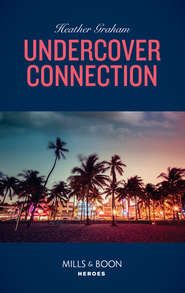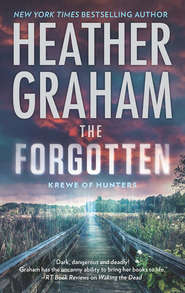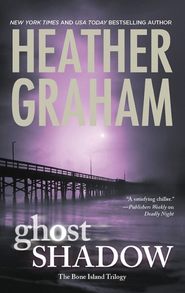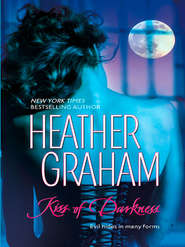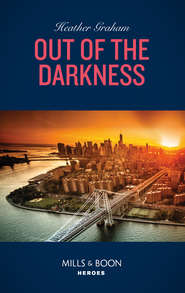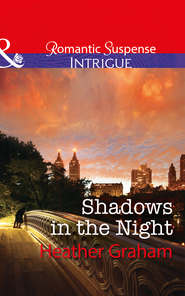По всем вопросам обращайтесь на: info@litportal.ru
(©) 2003-2024.
✖
The Presence
Автор
Год написания книги
2018
Настройки чтения
Размер шрифта
Высота строк
Поля
But she was still standing, just as he had left her. To his sincere dismay, he felt a swift stir of arousal. The flannel should have hung around her like a tent, but it was sheer enough for the light to play with form and shadow. And there was that hair … long, lustrous, blond, curling around her shoulders and breasts.
“A drink. You need a drink,” he told her. Hell, he needed one.
She lifted a hand suddenly, obviously regaining some of her composure. “Sorry, I don’t have any.”
“Thankfully you didn’t jimmy the wardrobe,” he told her. “I’ll be right back.”
He went back through the bathroom and opened the wardrobe, found the brandy and poured two glasses from the left-hand shelf. Returning to the bride’s room, he found that she had taken a seat in one of the old upholstered chairs in front of the fireplace.
He handed her a glass. She accepted it, her blue eyes speculatively on him. “Thanks,” she told him.
“They say it will cure what ails you,” he told her, lifting his glass. “Cheers.”
“Cheers,” she returned. A little shiver snaked through her as she took a long swallow. “Thanks,” she said again.
He set his glass on the mantel, hunkered down and adjusted the logs again. A nice warmth was emanating from the blaze now.
He stood, collected his glass again and took the chair by her side.
“So … do you want to talk about it?”
A twisted smile curled her lips. She looked at him. “Sure. It was you.”
“Me! I swear, I never left that room,” he protested.
“I know. It was very strange. It was as if I had wakened and … there you were. Only, it wasn’t really you. It was you—as you might have been—in historical costume. It was very, very real. Absolutely vivid.”
“So I was just standing there, in historical costume? Well, I can see where that might be a bit unsettling, but those screams … It sounded as if the devil himself had arrived.”
She flushed slightly.
“You were in more than costume.”
“Oh?”
“Were it a picture, the caption might have read, ‘Speak softly and carry a very big and bloody sword,'” she said.
“Ah. So I was about to lop off your head. Sorry, I may be irritated and rude, but I do stop short at head-lopping,” he told her, then turned, getting comfortable in the chair. “Don’t you think you might have gotten a bit carried away with your historical fiction?”
“I have to admit, I’ve scared myself a bit,” she murmured. “I made up a Bruce MacNiall, only to find out that he exists. Well, in the here and now, that is.”
Bruce shook his head, wary now. “You must have known some of the local history.”
“No, not really. We hadn’t ever been to this area when we decided to attempt this venture,” she assured him.
It sounded as if she was telling the truth. And yet …
He swirled the brandy in his glass, studying the color. Then he looked at her again. She couldn’t be telling the truth.
“There was a Bruce MacNiall who fought with the Cavaliers. He opposed the armies Cromwell led and beat them mercilessly many times. At first, he even survived Cromwell’s reign. But he and some other Scottish lairds kept at it, wanting to bring Charles II back from
Europe and see him crowned king. He was eventually caught when one of the lairds supposedly on his side turned coat. That man was killed by MacNiall’s comrades, but unfortunately MacNiall rode into a trap and was caught himself. He had defied the reigning power, which was Cromwell. You know the penalty for that. He received every barbarity of the day that was reserved for traitors.”
She turned to him, blue eyes enormous. Then she closed them and leaned back, looking ashen.
“Hey, sorry. It’s history. I didn’t get the sense that you had a weak stomach.”
She shook her head. “I don’t,” she said flatly, and he realized that the particular history he was giving her was more disturbing to her than it was to him.
She looked at him. “He didn’t murder his wife in a fit of jealousy, did he?”
Bruce shrugged, watching her closely. “No one knows. There was some rumor that she kept company with a certain Cromwellian soldier—whether true or a pure invention, I don’t know—and that she disappeared from the castle. It’s historical fact that MacNiall was castrated, disemboweled, hanged, beheaded and generally chopped to pieces. But as to his wife, no one knows for certain. She disappeared from history, right when he was caught. He was trapped in the forest. And executed there, after a mock trial. At the time he died, he had a teenage son running with Charles II in France. Very soon after MacNiall’s execution, Cromwell died, and the people, very weary of being good, were anxious to ask him back to take the throne. Charles proved to be a very entertaining king, and a truly interesting man. He might have dallied with dozens of mistresses, but he steadfastly refused to consider a divorce from his wife. So after him, his brother became king, and that was another disaster for history to record.”
It’s … horrible!” Toni said.
He smiled grimly. “From what I hear, you didn’t mind fleecing the public with such a horrible story.”
“But it wasn’t true when I told it!” she protested.
He waved a hand in the air impatiently. “Say you’re telling me the truth—”
“Are you accusing me of lying?” she demanded indignantly. The anger was back in her eyes.
“I don’t know you, do I?” he asked politely. “But even if you think you’re telling the truth, it’s quite possible that you heard the story somewhere else. Because you made it up to a tee.”
She waved a hand in the air. “The land belonged to the MacNialls. And if there is anyone famous in Scottish history, it’s Robert the Bruce. Bruce. A very common name here!”
“Aye, that’s true. But you went a step further.”
“How?”
He stared at her. She was either the finest actress in the world, or she really didn’t know.
“MacNiall’s wife,” he said slowly, watching her every reaction.
“You just said that history didn’t know about her!”
“Aye, that’s true enough.”
“Then …?”
“Her name,” Bruce said softly. “Lady MacNiall. That would be fairly obvious!” she said disdainfully.
“No, Toni. Her first name. Her given name. Annalise.”
3
Could anyone act so well, or even lie with such aplomb?






